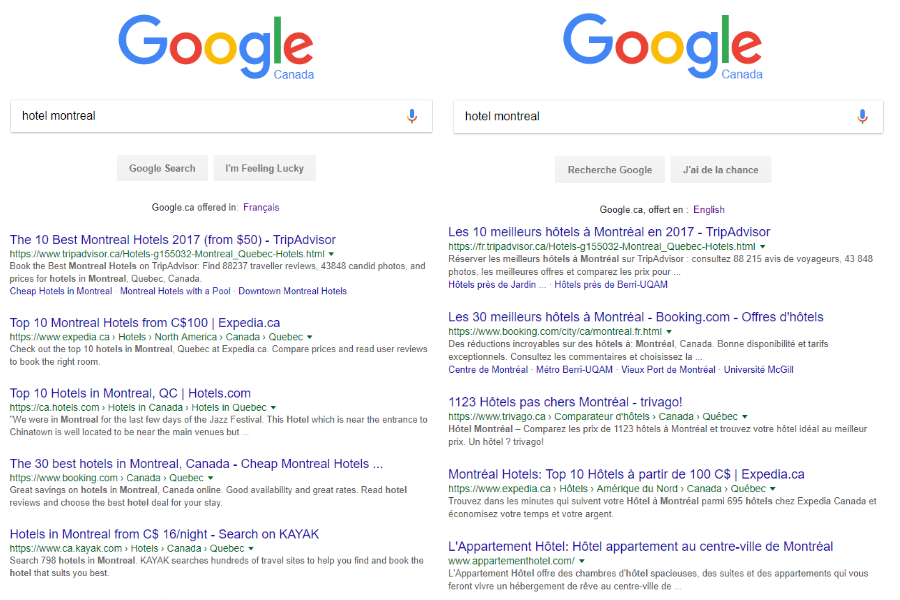Canada is a great market for US companies testing the international export waters for the first time, but equally offers a great long-term international business growth opportunity. Canada is the go-to export market of many US companies, not only thanks to its close proximity, which allows for easier, more affordable shipping and order fulfilment, but also thanks to lower language and cultural barriers. But how about the barriers of the online world? What should you consider when building a website(s) for Canada?
 Language: The official languages of Canada are English and French. Even though 85% of Canadians do speak English to varying extents, it is the mother tongue of only about 60% of its population. A US website might be therefore understandable to most Canadians, but it won’t provide them with a local and native experience that we’re looking for when building trust in a new export market. Most Americans are familiar with the Canadian accent, but did you know that the written language – Canadian English – is a language in its own, and contains elements of British English, American English, as well as numerous local Canadian terms? It is therefore important not to use American English, or British English, but strictly Canadian English on your website for Canada, in order to provide a genuine experience to your existing and potential customers as well as business partners north of the US border.
Language: The official languages of Canada are English and French. Even though 85% of Canadians do speak English to varying extents, it is the mother tongue of only about 60% of its population. A US website might be therefore understandable to most Canadians, but it won’t provide them with a local and native experience that we’re looking for when building trust in a new export market. Most Americans are familiar with the Canadian accent, but did you know that the written language – Canadian English – is a language in its own, and contains elements of British English, American English, as well as numerous local Canadian terms? It is therefore important not to use American English, or British English, but strictly Canadian English on your website for Canada, in order to provide a genuine experience to your existing and potential customers as well as business partners north of the US border.
French spoken in Canada has different variations depending on region (Acadian French, Metis French, Newfoundland French etc.), but it is Quebec French which is considered to be the most widely spoken type of Canadian French and the one which would be generally recommended for a Canadian website targeting the French speaking population. How different is Quebec French compared to the Metropolitan French? Linguists tend to agree that the difference is greater than between British and US English, and comparable to that between European and Brazilian Portuguese.
So does this mean that you should have two websites for Canada, to comfortably cater for needs of this nation? Yes, it does! Ready to learn more? Register our webinar: How to sell online in Canada.
Currency: Canadian dollar ($), sometimes referred to as Can$ or C$. Did you know, that the Canadian dollar is the world’s fifth most held reserve currency? (Source: International Monetary Fund)
Units of measurement: Metric system is the official one in Canada, creating a major website localization obstacle for many US companies. Non-metric, imperial units – which are largely similar to the US customary units - can be seen in certain sectors of the Canadian economy due to its ties to the United Kingdom and the USA, but a general use of imperial units or US customary units is not recommended for a Canadian website (be it English or French), especially in relation to product specifications. Whereas the metric units are a must, the other types of units are an optional extra, permitted to be displayed.
Although the imperial units are still visible in daily lives of Canadians in certain respects, Canada has been quite thorough in implementing the metric system; more so than the United Kingdom, which still keeps road signs, including speed and distance, in miles/yards/feet and miles per hour.
Don’t forget that metrification goes hand in hand with the use of degrees Celsius °C, and not Fahrenheit °F!
Local domain extension: .ca

The .ca domains are managed by CIRA and can be registered through a number of certified registrars. Note that in order to register .ca, CIRA requires you to fulfil the Canadian Presence Requirement, which broadly speaking requires you to be an individual or a corporation within Canada (or, Her Majesty Queen Elizabeth the Second and her successors!). The requirements are strict, but there are alternative ways how to get the “ca” into your website if you don’t meet the requirements. Ask us for details!
Online payment methods: Credit cards are by far the most commonly used online payment method among Canadians. However, a recent trend in Canada encourages eshops to offer alternative payment methods that don’t require customers to share banking details with the merchants. These methods include Interac, Instadebit or PayPal.
Local search engines: Google dominates online searches in Canada, with an estimated share of 90% with Yahoo a distant follower.
But is it all the same Google? Of course not, that would be too easy. Google.ca is available in two versions - languages, and for each search it will offer you different results: the French Canadian Google favoring websites in French, and English Canadian Google in English. In both (English and French) cases, local websites built on .ca domains or on ca subdomains/subdirectories will generally get more visibility over .com.
On the comparative screenshot below, we have searched on English google.ca “hotel montreal” and then did the same search on French google.ca. Both searches were on googla.ca and using the exact same search term (we have intentionally used one of the few terms that work in both English and French). The only aspect of search that was different was the choice of language on the google.ca landing page, which have consequently given us completely different search results. Results, that are local and relevant.

Local social media platforms: Social media are a very popular communication platform, with 18% of all interactions being with businesses. Facebook is the #1, with YouTube and Instagram also growing in use and popularity. Twitter, Google+, Pinterest and LinkedIn usage have been rather stagnating lately. Did you know, that every 2 out of 3 Canadians visits Facebook at least twice a week? This makes Facebook a marketing channel worth considering for your business use in more detail!
Are you keen on adding Canada to your international business expansion success? Contact us, so we can help you!

